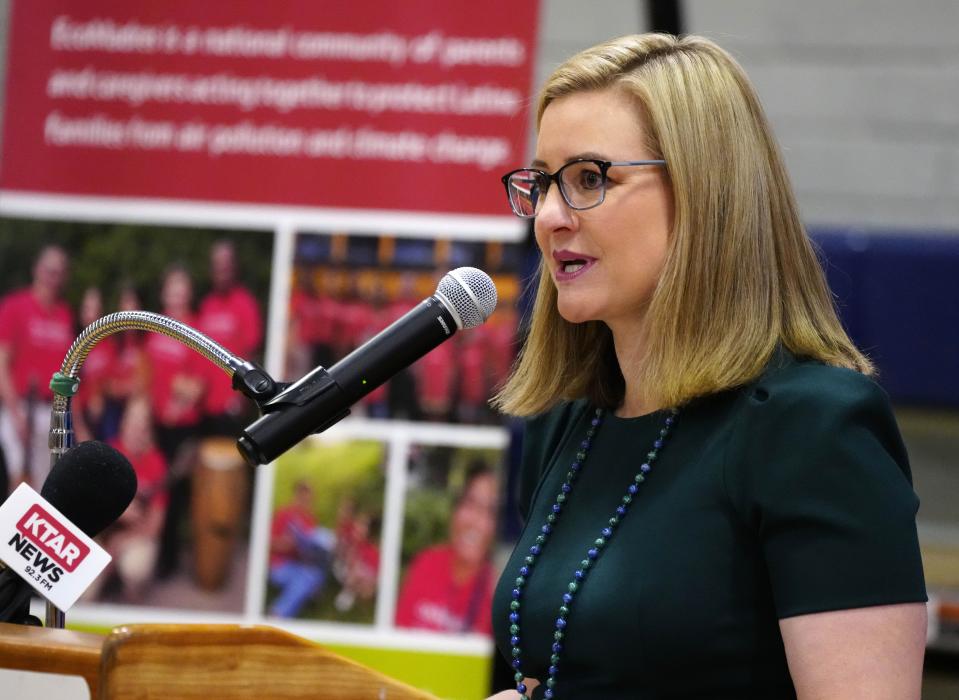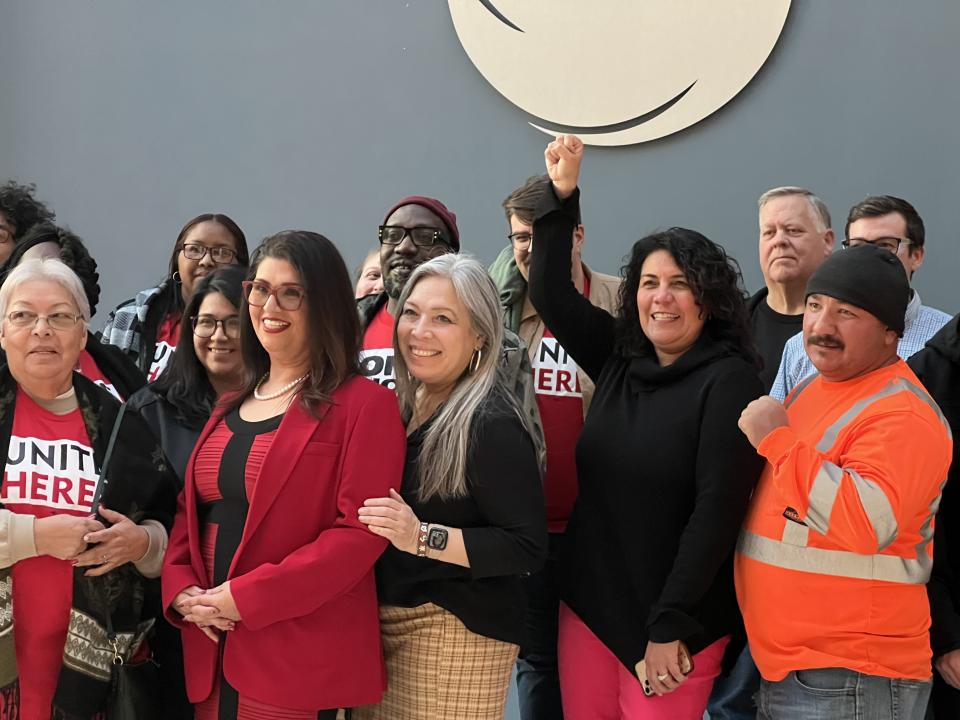Maricopa County judge: Phoenix, Tucson broke law with prevailing wage ordinances
- Oops!Something went wrong.Please try again later.
Arizona cities cannot pass prevailing wage rules after all, a Maricopa County Superior Court judge ruled.
Judge Bradley Astrowsky ruled Friday that Phoenix and Tucson violated state law when they passed ordinances in January that regulated pay rates for construction workers on certain city jobs. The decision could cap a years-long battle waged at multiple city halls across Arizona unless one of the cities chooses to appeal.
There's no official decision out of Phoenix or Tucson yet — the mayor and city council in each location would likely give such a direction to their attorneys in a closed-door meeting.
"Prevailing wage" rules guarantee workers are paid similar rates to others who do comparable work in the area. Supporters say they help level the playing field by protecting laborers from low wages, while critics contend they burden businesses.
Astrowsky said cities were banned from passing prevailing wages because of a 1984 state law that plainly says cities "shall not require public works contracts to contain ... prevailing rate of wages."
He rejected arguments from the cities and Arizona Attorney General Kris Mayes, which contended that prevailing wage is a type of minimum wage, and thus allowed because of the 2006-voter approved minimum wage law.
The 2006 law gave cities authority to enact minimum wages. Mayes said because it was passed directly by voters and more recently than the 1984 law, it should take precedence because it showed the will of the voters.
"The earlier prevailing wage statute was obviously enacted with no awareness of the law to come, but the minimum wage law was enacted with the benefit of hindsight," Mayes wrote in her opinion.
More: Ariz. attorney general opinion backs prevailing wage 2 months after Phoenix repeals ordinance
But Astrowsky said that courts generally disfavor "implied repeal of laws." He said the Attorney General's rationale in this case was wrong because the 1984 and 2006 laws can co-exist.
"The two are not calculated in the same method, thus, to equate same is not logical," Astrowsky wrote. Minimum wage, he explained, is an "across-the-board floor," while prevailing wage is an "average wage based on a particular trade and locality."
The ruling is a win for The Goldwater Institute, a libertarian-leaning think-tank that filed the lawsuit on behalf of three nonprofit corporations representing the construction industry: the Associated Minority Contractors of Arizona, the Arizona Chapter of the Associated General Contractors of America and the Arizona Builders Alliance.
The Goldwater Institute put out a statement Monday saying this decision was "a victory for Arizona taxpayers—who deserve to have public works projects run as closely as possible to true market conditions, instead of having their costs decreed by politicians in order to benefit their political friends."
The groups sued Phoenix and Tucson in January after both cities passed similar ordinances.
Phoenix's ordinance applied to companies with contract prices higher than $4 million, and Tucson tried to do so for contracts higher than $2 million. Both city ordinances had record-keeping requirements and penalties for violations.
The decision means Phoenix and Tucson cannot enforce their ordinances, which were set to take effect in a week.
Tucson Mayor Regina Romero responded Monday saying, "I’m disappointed in today’s ruling. Prevailing wages have been a tool to uplift our communities, improve our local economy and protect workers from being underpaid and taken advantage of. The City of Tucson will continue to find ways to create a better quality of life for workers and their families, as we’ve done previously.”
Tucson City Attorney Mike Rankin said, "We will review our appeal options and discuss those options with the Mayor and Council.”

Phoenix Mayor Kate Gallego said Monday, "Today’s decision is disappointing, and we are exploring potential next steps. Those building the future of our city deserve to be paid fairly and I plan to exhaust every legal avenue to ensure workers earn the wages they deserve.”
It's unclear exactly how much workers' wages would have been affected, but in Phoenix, City Manager Jeff Barton estimated roughly $17 million per year, plus another $1.4 million annually to hire 12 new positions needed to implement and enforce the ordinance.
Also unclear is whether the ruling could affect city leaders' trust and willingness to rely on Mayes' opinion in the future.
Gallgo said when the city passed its ordinance they were explicitly relying on Mayes' opinion. She and other city leaders had previously expressed concerns over the legality of prevailing wage.
Phoenix ultimately passed its current ordinance after years of emotionally charged back-and-forth on the City Council and after Mayes affirmed its legality in her opinion.
Phoenix Councilwoman Debra Stark, who voted against Phoenix's prevailing wage ordinance citing concerns over legality, said the ruling did not affect her trust in Mayes.
"I think she's a thoughtful person. She's a very smart person," Stark said. "It's just one opinion."
City spokesperson Dan Wilson said Barton and City Attorney Julie Kriegh would wait for guidance from the City Council on next steps.
Tucson officials did not immediately respond to requests for comment.
Mayes and council members disagree with ruling
Richie Taylor, a spokesperson for the attorney general, said Mayes' office "respectfully disagrees" with the ruling.
He held firm on Mayes' opinion that prevailing wage is a type of minimum wage, and that voters gave cities the authority to enact such regulations.
Taylor said that attorneys general are always asked to opine on hard questions, and that, "Inevitably, courts will sometimes disagree."
Councilmembers Laura Pastor and Betty Guardado, two of the strongest backers of the ordinance, both said they were "disappointed" in the ruling.

Pastor said she wants the city to appeal the decision. She rejected questions about whether she should have heeded the mayor and city attorney's concerns over legality.
"No," Pastor said. "Prevailing wages are already required on federal projects or city projects that are federally funded. Our workers deserve to be paid what they earn. We should have done this years ago."
Guardado did not take questions but released a statement saying she will keep fighting for the rights of city workers to earn decent livings.
"When we as a Council passed this ordinance, our hope was that we might uplift our hardworking labor force and guarantee higher quality construction projects for our city by eliminating wage disparities caused by market fluctuations," Guardado said in a statement. "This decision makes it much more difficult to create an environment that promotes fairness and prosperity for every worker."
Councilwoman Stark said she thinks the city "should just let it rest," but said she would entertain discussions about living wages in future city contracts.
Ruling could end a years-long City Hall battle
Friday's ruling could end a years-long battle that ravaged Phoenix City Council.
Pastor and Guardado had worked with former Councilmembers Yassamin Ansari and Carlos Garcia for years trying to pass the ordinance.
Council first asked staff to consider a prevailing wage ordinance in 2020, Pastor said, but staff needed the council's permission to research any one issue for more than eight hours. The council rejected that request.
Later in October 2021, Pastor, Guardado, Ansari and Garcia lobbied to pass the ordinance but were outvoted.
They forced the issue again in March 2023. They passed it after former Councilman Sal DiCiccio, a conservative, unexpectedly aligned with them to approve the issue.
But just four weeks later, after DiCiccio and Garcia left office, the new council repealed the ordinance.
Mayes' issued her opinion backing the legality of prevailing wage shortly after Phoenix's repeal.
Barton returned to the council in January 2024 with a more limited version of the prevailing wage ordinance that City Council then passed. Councilmembers Stark, Jim Waring and Ann O'Brien voted no.
O'Brien and Stark said at the time that despite Mayes' opinion, they continued to believe prevailing wage was illegal for Phoenix to implement.
It could be unlikely Phoenix City Council would direct attorneys to appeal the ruling. A vast majority of the city's current elected leaders previously expressed legal concerns: Gallego, O'Brien, Waring, Stark, Kevin Robinson and Kesha Hodge Washington.
Taylor Seely covers Phoenix for The Arizona Republic / azcentral.com. Reach her at tseely@arizonarepublic.com or by phone at 480-476-6116.
Reporter Sarah Lapidus, who covers southern Arizona, contributed to this report. Reach her at sarah.lapidus@gannett.com.
The Republic's coverage of southern Arizona is funded, in part, with a grant from Report for America. Support Arizona news coverage with a tax-deductible donation at supportjournalism.azcentral.com.
This article originally appeared on Arizona Republic: Maricopa County judge: Phoenix, Tucson broke law with prevailing wage

